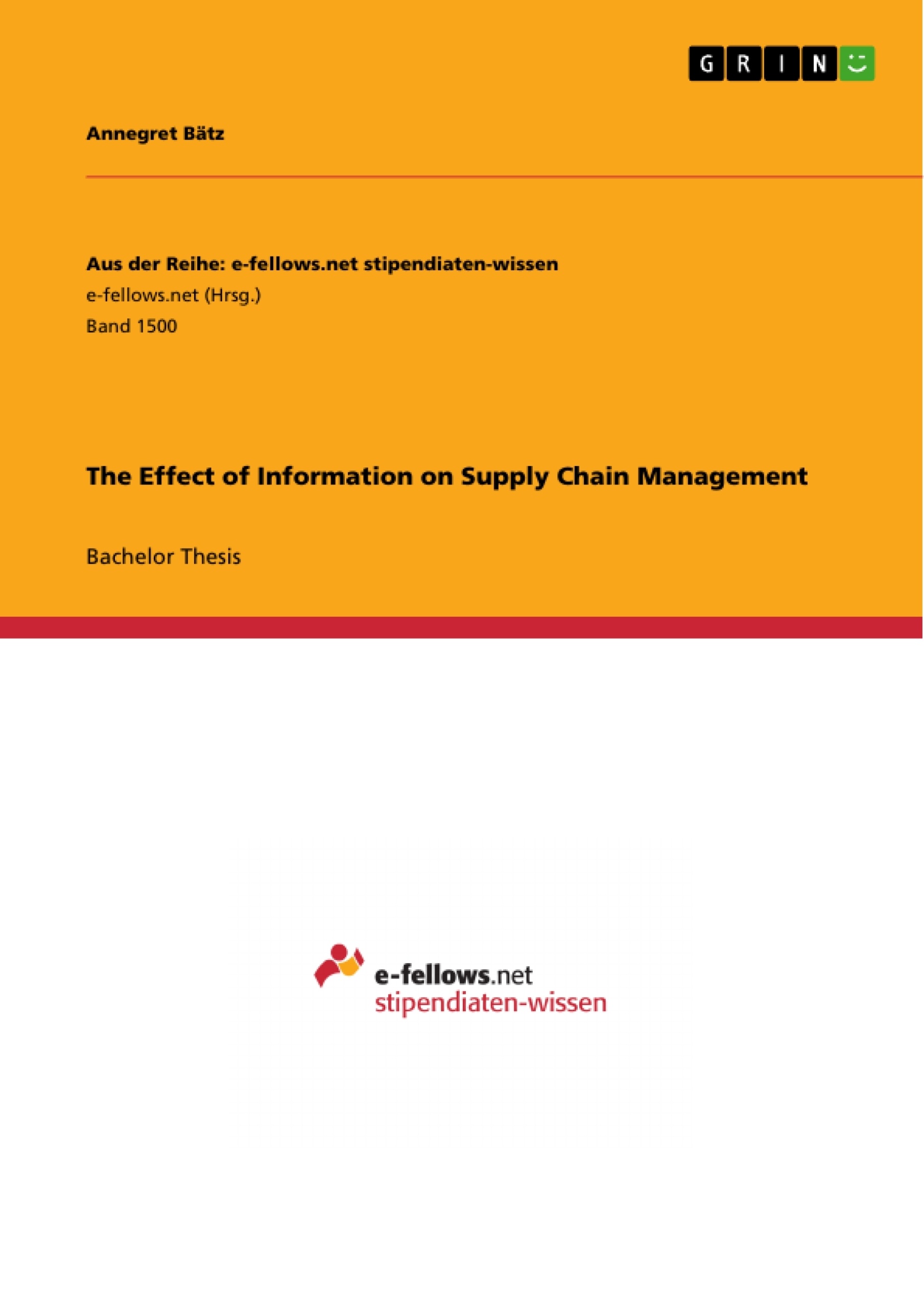Everyday thousands of containers are shipped worldwide in order to fulfil customer orders in time. Nowadays focusing only on domestic markets is no longer an option for achieving long-term business success as global competition forces companies to recognise the need for superior design, planning, operation, and coordination of their supply chain activities. These are strongly supported by the rapid progress of information technologies.
This thesis aims at establishing the importance of information and its effects on supply chain management, thereby pointing out key aspects that technology plays in managing information. It is structured in the following way: The first chapter defines the relevant terminologies helpful in understanding the overall topic. The second chapter moves on to describe in greater detail the effective management of information flows and their relevance for the three supply chain macro processes. Before proceeding to examine information technologies; chapter 3 deals with the collaborative planning, forecasting, and replenishment approach in order to outline a framework for information exchange along the supply chain. In chapter 4 it is then necessary to discuss the impact of information technologies on facilitating the management of supply chain activities and processes. The fifth chapter follows from the previous one by establishing how technology facilitates the physical movement and storage of inventory in warehousing by addressing the most used supply chain software: warehouse management systems. The final chapter summarises the main results of this thesis.
Inhaltsverzeichnis (Table of Contents)
- 1. Introduction and Background Information
- 1.1. Definition of Logistics
- 1.2. Definition of Supply Chain Management
- 1.3. Logistics and Supply Chain Management
- 1.4. Definition of Data and Information
- 2. Information - A Support of Supply Chain Decision Making
- 2.1. Information Flows
- 2.1.1. Push/Pull Principle
- 2.2. Information Requirements
- 2.3. Information Value
- 2.3.1. Cost/Benefit Ratio
- 2.4. Supply Chain Macro Processes
- 2.4.1. Information Visibility
- 2.4.2. Trust
- 2.5. Conclusion
- 3. Collaborative Planning, Forecasting, and Replenishment
- 3.1. Supply Chain Collaborations
- 3.2. General Information about CPFR
- 3.3. The Nine-Step CPFR Model
- 3.3.1. Planning
- 3.3.2. Forecasting
- 3.3.3. Replenishment
- 3.4. The New CPFR Model
- 3.4.1. Analysis: Performance Assessment
- 3.5. Benefits of CPFR
- 3.5.1. Wal-Mart's CPFR Pilot Project
- 3.5.2. The Bullwhip Effect
- 3.6. CPFR Challenges
- 3.7. Conclusion
- 4. Information as Technical Tool
- 4.1. The Emergence of Supply Chain IT
- 4.2. Data, Information, and Supply Chain IT
Zielsetzung und Themenschwerpunkte (Objectives and Key Themes)
This thesis explores the critical role of information in supply chain management and how technology facilitates information management. It investigates the impact of information technology on supply chain activities and processes, examining specific examples such as warehouse management systems.
- The importance of information in supply chain management
- The impact of information technologies on supply chain activities
- The role of information flows and their relevance to supply chain macro processes
- Collaborative planning, forecasting, and replenishment (CPFR) approach
- The use of warehouse management systems in facilitating inventory movement and storage
Zusammenfassung der Kapitel (Chapter Summaries)
Chapter 1 introduces the concepts of logistics and supply chain management, defining key terms such as "data" and "information" to establish a foundation for understanding the thesis's focus. Chapter 2 delves into the role of information in supporting supply chain decision-making, examining information flows, requirements, and value. It explores the significance of information visibility and trust within supply chain macro processes. Chapter 3 focuses on collaborative planning, forecasting, and replenishment (CPFR), a collaborative approach to information exchange along the supply chain. It outlines the nine-step CPFR model, its benefits, challenges, and examples like Wal-Mart's pilot project. Chapter 4 examines the emergence of supply chain IT and its impact on data, information, and supply chain processes.
Schlüsselwörter (Keywords)
This thesis focuses on information management in supply chain management, including topics such as information flows, information visibility, trust, collaborative planning, forecasting, and replenishment (CPFR), supply chain IT, warehouse management systems, and the impact of technology on supply chain activities and processes.
Frequently Asked Questions
How does information affect supply chain decision-making?
Information acts as a support for decision-making by providing visibility into flows, requirements, and value across the three supply chain macro processes.
What is the Collaborative Planning, Forecasting, and Replenishment (CPFR) approach?
CPFR is a framework for information exchange along the supply chain involving a nine-step model that focuses on collaborative planning, forecasting, and replenishment to improve efficiency.
What is the "Bullwhip Effect" in supply chain management?
The Bullwhip Effect refers to increasing fluctuations in inventory in response to customer demand changes as one moves further up the supply chain; CPFR helps mitigate this effect.
How do Warehouse Management Systems (WMS) facilitate logistics?
WMS are specialized software that facilitate the physical movement and storage of inventory within warehouses, optimizing storage and retrieval processes.
Why are trust and visibility important in supply chain collaborations?
Trust and information visibility are essential for effective collaboration, ensuring that all partners have accurate data to coordinate activities and reduce costs.
- Quote paper
- Annegret Bätz (Author), 2014, The Effect of Information on Supply Chain Management, Munich, GRIN Verlag, https://www.grin.com/document/301895



